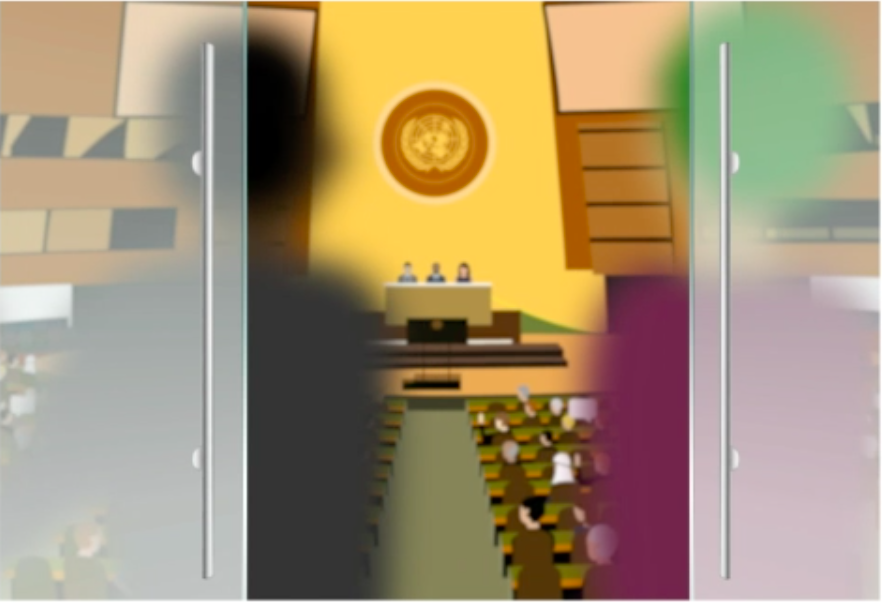The ECOSOC Committee on NGOs plays a key role in opening doors to NGOs at the UN by recommending NGOs for consultative status. The Committee on NGOs has regularly been criticised for a failure to fulfil its mandate and for carrying out reprisals against NGO applicants by denying them accreditation. Elections will be held next April for the 19 seats on the Committee. This is the time for States to fufil their responsibility to ensure NGO access to and participation in UN bodies, as called for in the following open letter to States from NGOs from around the world:
OPEN LETTER TO MEMBERS OF THE UN’S GENERAL ASSEMBLY REGARDING THE ECOSOC COMMITTEE ON NGOS
To: Member States of the UN General Assembly
Cc: President of ECOSOC, President of the General Assembly, President of the Human Rights Council, UN Secretary General.
Excellencies:
We are one year out from elections to the ECOSOC Committee on Non-Governmental Organisations for the 2023-2026 term. These elections provide states with a commitment to ensuring civil society access and participation, with the opportunity to stand as candidates for membership. They are also the moment for members of ECOSOC to vote with integrity, ensuring the new membership of its subsidiary body is fit to fulfil its mandate.
To coincide with the 75th Anniversary of the founding of the United Nations, Member States recently committed to boost partnerships – to make the UN more inclusive and engage with all relevant stakeholders ‘to ensure an effective response to our common challenges’. In recommending approval of the participation of non-governmental organisations in a range of UN bodies and processes, the Committee on NGOs plays a key role in facilitating such partnerships. A membership of states committed to fulfilling such a task fairly and judiciously is essential.
With this in mind, we would like to make the following recommendations:
1/ States with an interest in facilitating and safeguarding civil society access to and participation in UN processes should stand for election to the Committee.
2/ Candidates should make public the reasons for their candidacy and their commitment to fulfil their responsibilities as members of the Committee, as per ECOSOC Resolution 1996/31.
3/ All regions should put up competitive slates, as the Asia-Pacific and GRULAC regions did in the last elections for the Committee in 2018. Competitive elections are important to create buy-in to the process and encourage states to be accountable for their commitments.
4/ All regions should make public candidacies at least two months before the elections to allow for proper consideration of candidates.
5/ All ECOSOC members should vote (and be encouraged to vote) only for candidates with positive track records in regard to civil society access and participation. Candidates could be assessed in regard to indicators such as support for relevant UN resolutions, such as those on civil society space and human rights defenders; on responses to cases of intimidation and reprisals; and on national level initiatives to safeguard civic space, press freedom – online as offline – and the right to defend human rights.
6/ ECOSOC members should consider introducing term limits for membership of the Committee on NGOs, among other reforms encouraging openness and accountability. As with other UN bodies, states should be required to leave the Committee for a specific interval of time after serving for a maximum agreed period. Term limits would encourage greater diversity in membership over time and encourage states to step up as candidates.
The Committee on NGOs is entrusted with an important task in opening the door of the UN to the expertise and experience of civil society partners. It requires members that are committed to fulfilling the Committee’s mandate in a fair, transparent, non-discriminatory, expeditious and apolitical manner. It falls to all member states – as potential candidates and / or electors – to ensure that the Committee membership is fit for purpose.
Yours sincerely,
Access Now
Alliance for Democracy in Laos
Alliance for Equality and Diversity
Asian Legal Resource Centre
Asociación Española para el Derecho Internacional de los Derechos Humanos
Association de Solidarite Aide et Action Enfance Mali-Jiguiya Ton
Association for Community Research & Action
Association of War Affected Women
Bahrain Center for Human Rights
Botswana Watch Organization
Child Rights International Network
CIVICUS
Christian Solidarity Worldwide CSW
Collectif Sénégalais des Africaines pour la Promotion de l’Education Relative à l’Environnement
Colonie des Pionniers du Développement CPD
Commonwealth Human Rights Initiative
DefendDefenders (East and Horn of Africa Human Rights Defenders Project)
Digital Empowerment Foundation
Edmund Rice International Ltd.
Equal Rights for Persons with Disabilities International, Inc.
Families of the Missing
FIDA Nigeria
FOKUS – Forum for Women and Development
Freedom Now
Global Bersih
Global Justice Center
Global Peace and Development Organization
Graduate Women International
Guyana RainBow Foundation (GuyBow)
Helpline Foundation for the Needy Abuja
HIV Legal Network
Human Rights Defenders Network-SL
Human Rights House Foundation
Human Rights Watch
International Alliance of Women
International Dalit Solidarity Network
International Disability Alliance
IFBPW (International Federation of Business and Professional Women)
International Planned Parenthood Federation (IPPF)
International Planned Parenthood Federation Western Hemisphere Region (IPPFWHR)
International Service for Human Rights
Light Organization for Relief and Development Africa (LFORD AFRICA)
Jerusalem Center for Women
Journalists and Writers Foundation
Jubilee Campaign
KULU – Women and Development
Namibia Diverse Women’s Association
Network of Rural Women Producers
New Future Foundation
Nkomo Organization Inc.
Ohaha Family Foundation
Omega Research Foundation
Outright Action International
Pan Pacific and South-East Asia Women’s Association (PPSEAWA)
PEPA l’Humanitaire
Pleaders of Children and Elderly People at Risk-PEPA/NGO
Refugee Council of Australia
Sahkar Social Welfare Association
Servicios Ecumenicos para Reconciliacion y Recostruccion
SERVITAS Cameroon
Sisters of Charity Federation
South Sudanese Christian Women Mission for Peace
Swedish Association for Sexuality Education (RFSU)
TRIAL International
The Light Millennium
Urgent Action Fund for Women’s Human Rights
Unspoken Smiles Foundation
Validity Foundation – Mental Disability Advocacy Centre
Visaka Dharmadasa
Women4nonviolence
World Uyghur Congress
Yemeni Institute for Strategic Affairs
Yemen Organization for Defending Rights & Democratic Freedoms
Zonta International




